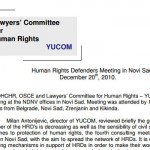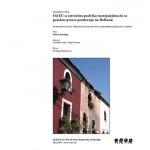“We are aware that Serbia will, like other countries in the region, face disasters and emergency situations which will prompt us to remember all the legal and other questions which rose during the floods,” says Milan Antonijevic, YUCOM Director.
Theses were the reasons behind the Manual on extraordinary situations in case of floods “Days After” which tries to offer answers to the legal questions.
The manual came about as part of the “Days after – active aid and support to citizens endangered by the floods” program and as an answer to the emergency and numerous challenges faced by civil society organizations during the floods.
“Writing a manual on emergency situations in hopes that someone will make use of it or, in ideal circumstances, won’t ever be required, is challenging,” said Antonijevic. He pointed out that the civil society organizations have joined forces since day one in order to collect and exchange information from the endangered areas and provide relief to the people affected by the floods. Actions of the civil society were directed toward sanitization of the disastrous consequences and the solving of legal and other problems which occurred during the floods in May. It’s important, said Antonijevic, to point out that relief was coming from all sides, especially from neighboring countries and this is proof that such harsh situations can bring about something good, such as solidarity.
Marko Blagojevic, Director of the Office for Reconstruction and Flood Relief stated that the current mission of the office is prevention and education. He reminded those present that the Government of Serbia passed the Flood relief Act in June 2014 and that this year marks the beginning of the realization of a series of projects worth at least
70 million euros dedicated to flood protection. Blagojevic also pointed out that with the passing of the new Risk of elemental disasters management Act is expected by the end of July Serbia will have a complete set of systematic solutions in this field. He also reminds us that over twenty thousand households have been destroyed in the floods and that the value of provided relief is estimated at four billion seven hundred and twenty million dinars.
The Office for Reconstruction and Flood Relief was focused on reconstruction, not on damages and it, above all, helped the people whose households were damaged ordestroyed in the floods and immediately afterword proceeded to infrastructure reconstruction. Aid and work with the civil society sector was of great significance andthis sector is expected to remain active in the passing of the act as well as remedyingthe consequences of the disasters. This is why, in his own words, this Manual is of extraordinary importance to the citizens of Serbia since it offers legal answers to questions on how the state regulates and offers relief to those affected by May’s floods.
The manual on extraordinary situations in case of floods “Days after” was created with the help of the Australian Embassy.
List of media which covered the conference:
Tanjug
Medjunarodni radio Srbija
Krstarica
Glavne vesti
N1
B92
RTS
Danas












